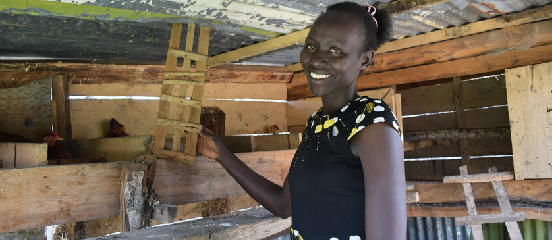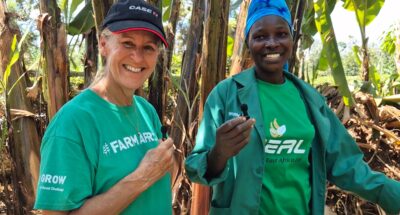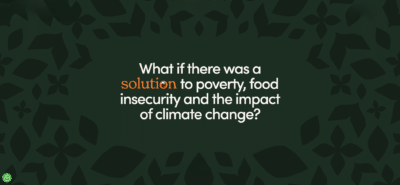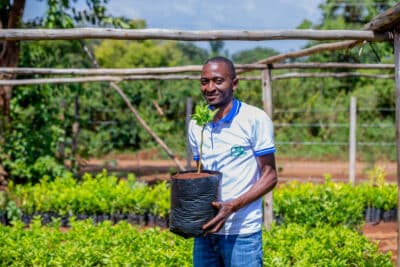News
9 September 2021
How vegetable farming is creating brighter futures for rural youth

After completing her high school education, 31-year-old Emily Jepkosgei from Mokoyo Village in Elgeyo Marakwet had her future figured out. Upon finalising a computer literacy course, she was hoping to join college.
As she pursued the short-term course, she asked her parents for a small portion of land from the family farm. Her mother obliged and gave her a 0.25 acre piece of land where she began growing maize.
She harvested 4.5 bags of maize, which she sold at Ksh 2,100 per bag, thus making Ksh 8,400 after nine months. She had spent approximately Ksh 6,500 on seeds, fertilisers, chemicals and packaging materials. Within the nine-month period, her profit was Ksh1,900, which amounted to Ksh 211 per month when she did her calculation. Emily recounts how frustrated she was upon the discovery.
After attending one training session organised by the Growing Futures market initiative funded with UK aid from the UK government, she decided to venture into horticulture.
She decided to start with French beans, which she planted on a quarter of an acre of farmland and tended to them carefully with guidance from the Farm Africa extension officers.
She harvested 1,600 kg and earned Ksh 72,500 from the 1,450 kg of the produce that she sold to the export buyer VegPro. After deducting her cost of production, which added up to Ksh 21,000, she had realised a profit of Ksh 51,500 within three months, which translated to Ksh 17,167 per month.
‘It was then that I realised I could make more money within a short period of time through vegetable farming,’ says the mother of one.
From this profit, Emily hired one acre of land and planted French beans on one half and snow peas on the remaining part. She harvested 2,300 kg of French beans and 1,800 kg of snow peas. She managed to sell 2,110 kg of French beans at Ksh 50 per kg and 1,690 kg of snow peas at Ksh 115 per kg, earning a total of Ksh 299,850.

Within the same season, Emily planted 3,500 cabbage seedlings in the quarter of an acre piece of land that she was given by her mother and sold each of the 3,000 cabbage heads locally at Ksh 20, thus making Ksh 60,000. In six months’ time, she had generated an income of Ksh 359,850 after investing Ksh 150,000.
With the proceeds from her French beans, snow peas and cabbages, she has diversified into poultry farming, where she gets a regular income by selling eggs and live chickens. She also applies the compost manure generated from the chicken waste to her farm.
The COVID-19 pandemic hit her hard in early 2020 since vegetable prices were low, thus shrinking her profits. Fortunately, the business training organised by Farm Africa helped her to diversify and she was able to earn a decent income from her poultry business.
Emily is an active member of her local village saving and loans association (VSLA) where she saves and borrows money. She set aside 10% of her farming income for a period of three years and used the money and interest earned to buy an acre of land at Ksh 350,000. She has now planted snow peas and is assured of a market for them since her group has signed a contract with VegPro.
“I am also knowledgeable in proper application of crop protection products after being trained on Global Good Agricultural Practices (Global GAP). The Growing Futures market initiative paid for my certification and now I have a code number through which I sell my produce in the UK market,’ she says proudly.
Emily and other members in her group have cut down post-harvest losses significantly by practising proper crop husbandry and using the group grading shed, which has a charcoal cooler to ensure that the produce stays fresh before collection by the export buyer.
The young farmer observes that vegetable farming has opened up her mind and made her realise that there are many untapped opportunities that young people can leverage. She is working towards expanding her farming enterprise so as to boost her revenue and is also planning to establish an outlet selling cereals. Construction of her own house in the farm she recently bought is now underway so that she can leave her father’s house.
‘I am now able to provide a balanced diet for my family and can afford to buy them good clothes. I have also enrolled my daughter in a good private school whose fees I am able to raise comfortably. I also plan to enrol in college soon,’ concludes Emily.





